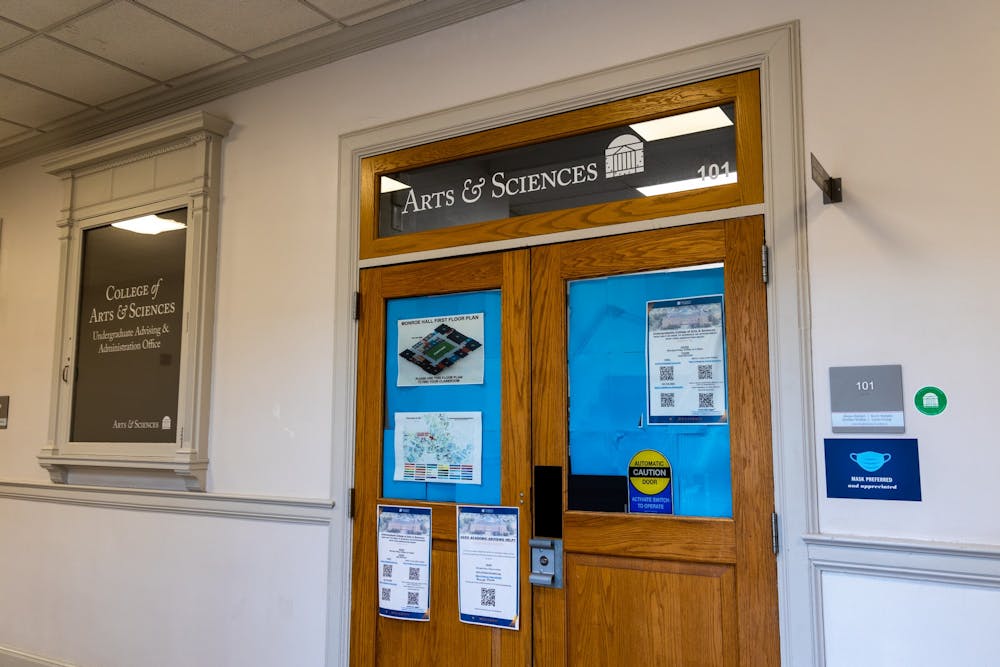Coming into college, I was excited at the opportunity to choose classes that catered to my academic interests. Four years of high school had forced me to memorize sines, cosines and tangents, when all I wanted to do was read Sylvia Plath and write short stories — I thought graduation meant it was finally over. However, reality struck when discovering the University’s significant number of general education requirements for the College of Arts and Sciences. My first year has been spent fulfilling requirements rather than further exploring my academic interests. The University's plethora of general requirements hinder students from being able to take classes that they find interesting which can serve to stifle productivity and lessen motivation. Although these requirements intend to reshape students’ outlooks on learning and broaden perspectives, they generally fail to accomplish this. For the betterment of all students and their time in academia, the University should lessen general education requirements.
Since the 2020-21 academic year, the College of Arts and Sciences has been requiring either the Engagements Pathway or the Disciplines Plus Pathway for almost all newly admitted students. Engagements courses offer students the chance to explore specific topics through an academic lens, while the Disciplines require students to pick from a variety of classes among seven different categories of study. Beginning in the next academic year, the Engagements Pathway will be the only pathway to fulfill general education requirements for the College. This path still requires completion of courses in all the various Disciplines — along with the completion of the Engagements and Literacies components — totalling at least forty-two required credits for completing the general education requirements. Students are essentially forced to take classes in subject areas that they may not need in the future nor enjoy in the present.
Despite the title of the Engagements Pathway, the general requirements associated with this program leave newly admitted students disengaged with their education — humanities students must sit through math classes, while science students must endure literacies and poetry. Although seemingly trivial, this reality can negatively impact students’ mental health and productivity. Research indicates a strong link between passion and productivity — placing students in learning environments where they struggle to find passion makes it difficult for them to have the motivation to get work done or actively participate. There are also a variety of mental health benefits to engaging in what one likes. A 2015 study found that engagement with things we find fun is associated with a more positive mood and less reported stress. Being motivated to engage in their studies helps students to better learn and retain information, and if the University seeks to foster a community of “engagement,” as the pathway title implies, it must first create a curriculum that inspires students to engage in the first place.
Proponents of abundant cross-disciplinary requirements argue its importance in providing students the breadth of knowledge that is characteristic of a liberal arts education despite the stress the requirements may induce. Perhaps they push students to step outside of their comfort zone and promote a more diverse learning environment. Something to consider, however, is that Echols Scholars in the College are given flexibility to explore their individual interests and are exempt from general education requirements outside their intended major. If general education requirements are so integral to a college education, why would an honor cohort be exempt from them entirely?
Additionally, when applying to a major, there are usually several prerequisites, corequisites or preferences of courses certain departments would like to see completed. Completing these classes takes time, and doing them on top of fulfilling general education requirements can be a handful for students. Limiting the number of requirements would provide the best of both worlds — students would still have the opportunity to branch out with some requirements while still having time to take care of the several other courses required to apply to their majors. Perhaps the University could make only four out of the seven Disciplines categories required of students, allowing them to choose which topics appeal most to them. This maintains the aspect of general education requirements that seeks to broaden students’ horizons, while simultaneously giving them more agency in their academic pursuits.
General education material does not always accomplish its goals for all students, nor is the course content used often in the real world. If not all students will make use of these extraneous general education courses in their future endeavors, why require us to endure so many of them? College should be a place where students can freely explore their desired interests. The University should lessen the burden of required curricula to ensure that our institution is one that cultivates students’ passions — not stifles their interest in learning.
Leila Mohajer is a Viewpoint Writer who writes about University life for The Cavalier Daily. She can be reached at opinion@cavalierdaily.com.
The opinions expressed in this column are not necessarily those of The Cavalier Daily. Columns represent the views of the authors alone.







